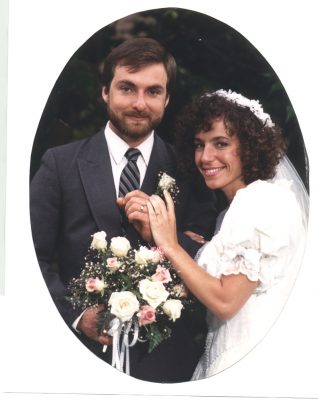A couple of years ago my wife and I found ourselves sitting around a table in a banquet hall, each of us talking to strangers. Several months earlier we’d joined a ballroom dancing group that met weekly at the local community hall to learn how to do the swing, foxtrot, waltz and other dance steps. That night we’d travelled to Sudbury, Canada, the closest city to us, about 3 hours drive away, for a dinner and dance at a large banquet hall. That’s when I found myself talking to Cheryl and thinking about my pasture fields at the same time.
- Reading Time = 10 minutes
Cheryl was probably in the second half of her sixties, we’d never met before, and though she was friendly and smiled as we talked, she also seemed emotionally burdened on some deep level. The pain seemed well entrenched too, like the cause of it had been with her constantly for decades. I found myself thinking of Cheryl, thinking about marriage, and thinking about fields, soil fertility and love.
As the night wore on, I learned that Cheryl had been a stay-at-home mother and homemaker and that her husband, Bill, was a recently retired high school teacher. I learned about their kids and life, and Cheryl told me about the glowing professional reputation Bill had earned over the years with the camping trips he’d take students on each year.
“Bill always had lots of time for his students”, she explained, with a forced smile and more meaning than was being delivered by her words alone. Later that evening I got to talk to Bill, and I mentioned how Cheryl had told me about those famous camping trips of his. “Really!”, he said, surprised. “She talked well about those camping trips? She’s never said anything positive to me about them. Never.”
I don’t know enough about the marriage of Cheryl and Bill to comment in depth about them, but what I learned that evening reminds me of the three kinds of marriages in the world, and the three corresponding kinds of farm soils situations that are analogies for them. As far as I can tell, Cheryl and Bill were mired in what I call a “starving soil marriage”.
The Starving Soil Marriage
When crops have been constantly removed from fields for decades, with nothing much returned to the soil to build it up, you get starving soil. From an agricultural point of view, yields are small, weird unwanted plants move in, and an ongoing downward spiral of ever-taking and never giving takes firm root. Starving soil can go on for a long time like this too, giving what it can, which is hardly anything at all, but getting even less. As I get older, I realize that a great many marriages are like “starving soil”. Neither partner has the emotional wherewithal to put love, sacrifice and selfless kindness into the marriage single handedly. It’s all take and no give from both sides. Always waiting for love before giving it, the starving soil marriage is like a tug-of-war stalemate, held together by nothing more than old vows, perhaps children, and some form of mutual dependency. It’s tragic and not uncommon in high mileage marriages. Unless something happens, the whole marriage reality will be one big, underwhelming sad-fest. Have you seen marriages like this? Are you in one?
The Heroic Marriage
Let’s say you have a field that’s run down and doesn’t grow well. The soil seems like it’s starving, you take soil samples and find that nutrients are, indeed, extremely low. No surprise there, but at least now you know numerically how bad things are. One way to change things is by adding nutrients via fertilizer, but the moment you look into this you discover something that gives you pause. Two things, actually. Not only is fertilizer expensive, but what good will it do? There are no guarantees. Some soils respond with a lot of “gratitude” when you give them nutrients, producing lots of new growth, vigour and good yields. But like I said, there are no guarantees. Sometimes soil is ungrateful, and won’t give much back in return for the expensive nutrients. As a farmer, what would you do?
Let’s say you decide to buy costly fertilizer, then apply it to a field that’s stingy, sad and sour. I know from experience that many times you need to keep up with this fertilizer “love” for many years before nutrient levels come back up to where they should be and productive growth happens. This is like giving and continuing to give emotionally in a marriage where your partner doesn’t give much back or anything at all. I call this “the heroic marriage”, and it is both sad and impressive to see. It is, most importantly, a living embodiment of the vows most of us said when our marriage was began: “for better or for worse” – at least on the part of one partner, anyway. I consider the heroic marriage far better than the starving soil marriage, but it’s still far from ideal.
The Rich Soil Marriage
This is about as good as human relationships get. To continue the farming analogy, the rich soil marriage involves regular care and feeding of your spouse. The resulting back-and-forth flow of love and fondness is what everyone wants in a marriage, isn’t it?
Some people feel that the only marriage worth sticking with is a rich soil marriage because that’s the only way both partner’s needs get met. The starving soil marriage does not meet anyone’s needs, obviously, and the heroic marriage will make one partner into a “door mat”, or so the saying goes. The underlying assumption here is that “getting your needs met” is the most important thing in life. This is not only a popular notion in our culture, but it’s often taught as a mental health imperative, too. Slowly, over time and watching many people who follow this idea, the only fruit I see is a growing level of selfishness and dissatisfaction. All of which leads to an important question.
Why Does It All Matter?
What’s the bottom line in all this talk about the three kinds of marriages? For me, as far as I’m able, and as often as I remember to do it, I prefer to follow a simple idea: “What would “real love” do?” To answer this question you first need to understand what real love is.
Sooner or later, in all human relationships, the need for real love emerges. If real loves is not offered (often as a sacrifice), then the relationship will die. I say “real” love because there’s a lot that passes for love in our culture that actually isn’t love at all. Mutual fondness may be the most common, but it only lasts until the fondness runs out and some offending event occurs. There’s also mutual dependence (and it’s somewhat more twisted close cousin one-sided dependence). “I need you or I’ll die” kind of “love”. More and more these days lust is mistaken for love too, but lust is actually very far from real love because ultimately lust is entirely selfish. Real love, by contrast, is difficult and foreign to the human heart. It comes naturally to no one. Real love says things like: “I will put myself second, in humility, and offer kindness and selfishlessness even to those who hate me and have wronged me.”
The ability to offer this kind of love, both inside marriage and outside, requires divine help, but cultivating the ability to truly love is the main work of life. They say that you can’t take money with you after you die, but that warning applies to most other things, too. The only thing you CAN take with you is the ability to love, and that ability is developed over years of life, dealing with unloving people. No one ever learned to truly love when constantly surrounded by loving people.
As a culture we’re losing the ability to love, as evidenced by the fragmentation of family and other relationships. The prevalence of serial monogamy is one example of the loss of the ability to offer real selfless love, but I see the loss in many other places, too. Real love is actually one of the hardest things a human being can embody. Or at least it’s hard sometimes. But when people who know how to truly love each other get together in lifelong commitment of mutual giving – a rich soil marriage – what you get is an experience of life that’s as good as it gets. The thing is, whether this happens or not is never entirely up to you. You don’t have the ability to choose a rich soil marriage because the choice comes down to two people choosing in the same direction, and you’re just one person. So in practice, the only choice you really have is between a starving soil marriage and a heroic marriage. What will you choose? Being the giving part of a heroic marriage is not easy, and I cast no judgement on anyone who can’t keep it up. One question, though . . .
When your life is all done, and you look back on how well you did (and we all will someday), would it not be something of great value if you could say: “Yes, it was hard giving real love when I got little or none in return, but being a giver was still better than waiting for the other to begin giving before I gave.”
Love is a Choice
More than 30 years ago, when I was a few weeks away from my own marriage, I was getting mentally prepared for the big day and I talked to a couple who’d been married for 10 years.
“What is marriage really all about?” I asked.
Both of them thought for a few minutes, then said they’d get back to me. I’m still waiting.
It’s taken me a long time to figure out my own answer to this question, and I offer what I’ve discovered here in the hopes that it might prove useful to you someday. To understand what marriage is supposed to be, you first need to understand what love really is.
As I said before, our English word for love means too many things to be useful, but I’ve found a definition that cuts through a lot of confusion:
“Love is the willingness to cheerfully and consistently put the happiness and well-being of another person ahead of your own, regardless of what you might get in return.”
Marriage is a lifelong commitment to lavish this kind of selfless love on your spouse, even when it gets in the way of your needs and wants, and even when they don’t offer real love back. Is this difficult? Yes, it is. Enormously difficult sometimes. But is it not also superior to a starving soil marriage? I say it is, and not just because it’s better in itself, but also because of the kind of person this sort of struggle can help you to become.
 I hope you found this article useful. Please let me know ([email protected]). Also, please consider helping with the creation and publication of articles here on BaileyLineRoad.com. The “buy me a coffee” button below makes it fast, safe and easy to contribute. Thanks to everyone who helps out regularly.
I hope you found this article useful. Please let me know ([email protected]). Also, please consider helping with the creation and publication of articles here on BaileyLineRoad.com. The “buy me a coffee” button below makes it fast, safe and easy to contribute. Thanks to everyone who helps out regularly.
– Steve Maxwell



